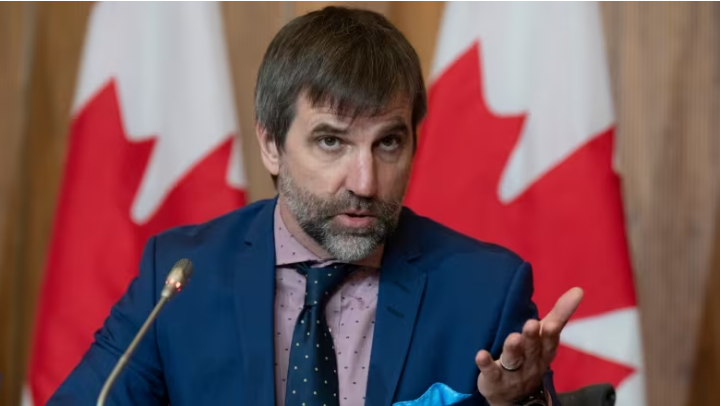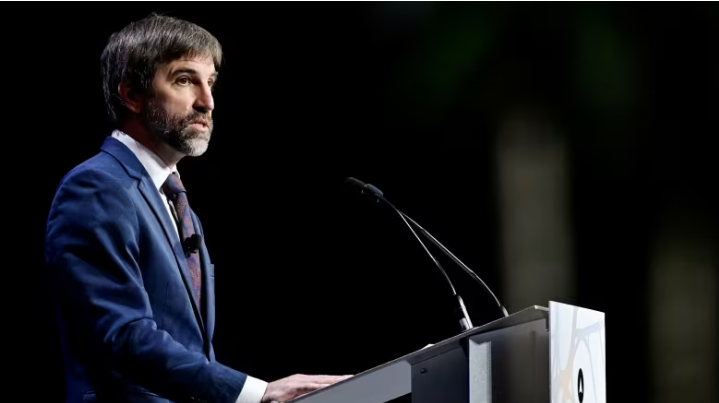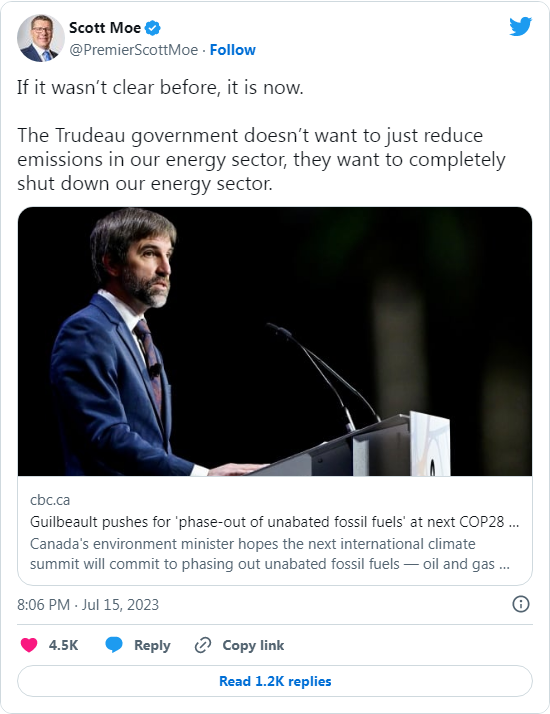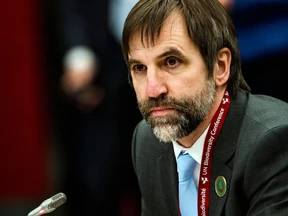
Minister of Environment and Climate Change Steven Guilbeault was in Calgary this week meeting with his provincial counterparts and business leaders. (Adrian Wyld/The Canadian Press)
Canada’s environment minister was in Alberta this week speaking to handfuls of stakeholders and politicians about decarbonization and clean energy.
But Minister Steven Guilbeault turned down a request for a meeting with major oil and gas company CEOs during the trip — amid industry anxiety about federal policies and timelines to reduce emissions.
The Pathways Alliance, a consortium of companies representing 95 per cent of oilsands production, asked for time with the minister during his visit to Calgary on Tuesday and Wednesday.
Two senior oil company executives told CBC News that Guilbeault’s office declined the request.
“Minister Guilbeault was unable to accommodate a meeting with Pathways Alliance during this visit,” a statement from Pathways confirmed.
“We are always willing to discuss with the minister ways we can collaborate to significantly reduce emissions from oilsands operations by 2030.”
Guilbeault’s office said the minister was only in Calgary for 36 hours. A department official was made available to meet with Pathways representatives.
“I had a pretty packed agenda,” Guilbeault said Thursday.
“I felt it would be important to meet with people I have less of a chance to talk to.”
But one oil executive expressed disappointment at being left off the minister’s itinerary given the weighty decarbonization policies he’s currently stickhandling.
“We are working well with the department, but it is frustrating when the minister is here he wants us to move faster but he doesn’t want to meet with us to discuss a plan,” they said.
CBC News has agreed not to name them, as they were not authorized to discuss company matters publicly.
The trip comes as Ottawa is pushing toward ambitious emissions reduction targets by the end of the decade.
Canada has committed to reaching net-zero by 2050, a timeline the industry and provincial government also subscribe to. The interim goals are more contentious.
The federal government’s 2030 targets would require the oil and gas sector to cut emissions 42 per cent below 2019 levels — a reduction so large the industry and province have called it a de facto production cap, and warned it isn’t feasible without significant economic sacrifices.
Last week, Guilbeault called for a global commitment to phase out “unabated” fossil fuels (oil and gas projects that don’t rely on technology to capture their emissions). He’s also leading the development of an impending emissions cap that could set limits at a total not seen since 1992.
And the federal government is also about to release a plan to end billions in “inefficient” fossil fuel subsidies.
Recent budgets have promised billions in tax credits and other incentives for green technology like carbon capture — spurred by the need to remain competitive with historic spending in the U.S. via the Inflation Reduction Act.
The minister’s office noted “frequent communication” has happened between staff, officials and the oil and gas industry, including several meetings with Pathways in the past 18 months. Alberta and Ottawa have also agreed to a working group on energy matters.
“This includes how to align our investments in hydrogen, CCUS (carbon capture, utilization and storage), SMRs (small modular reactors) and to continue engagement on the upcoming oil and gas emissions cap and the Clean Electricity Regulations,” Guilbeault’s office said.
The minister met with stakeholders like the Calgary Chamber of Commerce, the Business Council of Alberta, environmental groups, small energy producers, carbon conversion technology workers and his provincial counterparts, ministers Rebecca Schulz (environment) and Todd Loewen (forestry).
Their meetings focused on greening the electricity grid and emissions reduction. The federal government has set a timeline of 2035 for decarbonizing electricity production. While not directly tied to the oilsands, many producers have cogeneration plants that also produce electricity.
“I informed Minister Guilbeault that our government remains resolutely opposed to any federal cap on oil and gas emissions or electricity regulations that are not expressly consented to by Alberta,” Schulz said in a statement.
Alberta has requested the government share its data and risk analyses on the impacts of 2035 and 2050 targets with the province.
In 2021, the oil and gas sector produced more than a quarter of Canada’s total emissions. By 2030, Ottawa wants to see an 81 megatonne reduction in annual oil and gas emissions. Pathways says 22 megatonnes is achievable.

Canada’s Minister of the Environment and Climate Change Steven Guilbeault speaks at the GLOBE Forum 2022 in Vancouver on March 29, 2022. (REUTERS/Jennifer Gauthier)
Canada’s environment minister hopes the next international climate summit will commit to phasing out unabated fossil fuels — oil and gas projects that don’t rely on technology to capture their emissions.
Steven Guilbeault outlined his expectations for the next COP28 while meeting with fellow international ministers from Europe, Mexico, India, Japan, China and other countries.
One of those expectations is the eventual elimination of fossil fuel projects that lack a mechanism to prevent carbon emissions from escaping into the atmosphere. Carbon capture, yet to be proven at scale, has been proposed as a way for the oil and gas industry to continue production without changing the planet’s climate.
“We can make COP28 the first COP to acknowledge the need to phase out unabated fossil fuels,” Guilbeault said in prepared remarks after his annual meeting with international counterparts on climate action in Brussels.
COP, or the Conference of Parties, are annual meetings on climate change hosted by the United Nations. The host of the 28th COP is the United Arab Emirates (U.A.E.).
The conference’s president echoed Guilbeault’s hopes Thursday.
Calling the phasing down of fossil fuels “inevitable,” COP28 president-designate Sultan Al Jaber unveiled his country’s ambitions for the conference, which will be hosted in Dubai.
“We must be laser-focused on building the energy system of the future, a system free of unabated fossil fuels, including coal,” Jaber said in prepared remarks Thursday.
Jaber called for a tripling of renewable energy output, increasing energy efficiency and doubling hydrogen production to 163 million tonnes annually by 2030.
Both Canada and the United Arab Emirates are major oil-producing countries.
When the meeting of international ministers concluded, several countries issued their joint statement that seemingly departed from remarks made by Canada and the U.A.E.
Countries that support a climate diplomacy bloc, the High Ambition Coalition, called for “an urgent phase out from fossil fuels.”
Ministers from France, Germany, Spain, Ireland and others said this needs to start with a “rapid decline of fossil fuel production and use within this decade.”
It goes on to say that technologies such as carbon capture cannot be used to help prolong the life of the oil and gas industry.
“Abatement technologies must not be used to green-light continued fossil fuel expansion but must be considered in the context of steps to phase out fossil fuel use and should be recognized as having a minimal role to play in (the) decarbonization of the energy sector,” the online statement read.
The head of a network of climate advocacy organizations said the use of “unabated fossil fuels” waters down the action required to reduce carbon emissions, but admitted the language is still more ambitious than previously proposed by the U.A.E’s COP president-designate.
“Obviously, the word unabated is still a weasel word, but we are progressing in a good direction at the very least,” said Caroline Brouillette, the executive director of Climate Action Network Canada.
In a statement released Saturday, Alberta Premier Danielle Smith criticized Guilbeault’s comments around a net-zero electricity grid by 2035 and the emissions cap on oil and gas, which she calls a “de facto oil and gas production cut.”
“Instead of seeking ways to sow investor uncertainty and reduce support for Canadian energy globally, the federal government should focus on partnering with Alberta and investing in our national energy sector to achieve carbon neutrality by 2050 while simultaneously increasing energy production, jobs and economic growth for Canadians,” Smith said.
Saskatchewan Premier Scott Moe also criticized Guilbeault’s comments in a Twitter post Saturday.

Guilbeault met Thursday and Friday with his ministerial counterparts and high-level representatives from the United States, Mexico, the United Kingdom, multiple European countries, China, Japan, India, South Korea, Singapore, the Marshall Islands, Ethiopia, Senegal, Zambia, Egypt, Turkey, and the U.A.E. in Brussels for the Ministerial Meeting on Climate Action (MoCA) in Brussels.
These talks are focused on implementing the Paris Agreement. They’re also meant to help wealthier countries iron out their concerns before the UN’s upcoming COP 28 climate conference in Dubai.
Beyond phasing out unabated fossil fuels, Guilbeault hopes at the next COP wealthy countries will finally deliver on their past-due $100 billion US commitment to help developing countries reduce their emissions and adapt to climate change.
Guilbeault also said Canada continues to be a “strong advocate” for setting up a loss and damage fund that compensates poorer countries for the unavoidable economic, cultural and human losses from climate change.
The Federal Environment Minister’s decision to turn down a meeting with major oilsands companies during the Alberta visit signals a clear commitment to prioritizing environmental concerns over economic interests.
The denial of the meeting serves as a bold statement from the government, holding the oilsands industry accountable for its environmental impact and pushing for more sustainable practices.
With climate change becoming an increasingly urgent issue, the decision aligns with the government’s broader climate policy goals and showcases its dedication to meeting international environmental commitments.
The rejection highlights the delicate balance between economic growth and environmental preservation, prompting a broader conversation about the future of the oilsands industry and its role in Canada’s sustainable development.
Oilsands companies now face potential repercussions, both in terms of their public image and future interactions with the government, as the denial emphasizes the need for increased transparency and environmental responsibility.
Looking ahead, fostering collaboration between the government and the oilsands industry will be crucial in finding common ground and working towards a greener, more sustainable future for Canada. Ongoing dialogue and cooperation can pave the way for innovative solutions that benefit both the economy and the environment.

